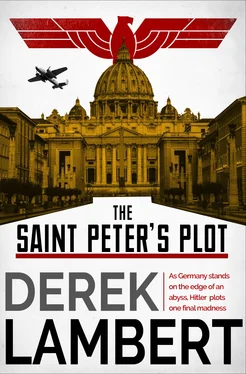Liam was disappointed to find that Maria had company. A young man with swaggering manners and, Liam suspected, many complexes, and a Sicilian who was never called by his name. Both men indulged in the sort of banter which many men employ to disguise their unease in the presence of clergy.
They drank from a carafe of red wine and smoked a lot, as did most of the other customers who crossed the river to find Bohemia. A musician in a grease-spotted black suit and open-necked white shirt was playing a violin, but only the occasional thin note penetrated the noise of Italians relaxing.
Liam and Maria completed the farce of comparing notes, then the swaggering young man named Angelo ordered more wine and topped up Liam’s glass, and Liam thought: “You’re trying to get me drunk, my young friend. What better joke than a drunken priest?”
“So, Father,” the Sicilian said, lighting a thin cigar, “what do you think of the latest events?”
“The war you mean?”
“What else? Your information must be good, Father. The best in Rome, eh?”
“I doubt if I know more than you,” Liam said, believing he told the truth.
“Come, Father, an American priest inside The Vatican. You must have access to much intelligence.”
Liam frowned. He couldn’t think of any particular intelligence that had come his way.
“Are you not in contact with Mr. Tittman, the American diplomatic representative?”
“I’ve met him,” Liam said.
“I’m told that he is angry because he doesn’t always have the same privileges as other diplomats.”
“That,” said Liam, “is because in the past the United States had barely recognised The Vatican diplomatically. It is only through the Holy Father’s kindness that he is there at all.”
“And Sir D’Arcy Osborne, the British envoy. Do you know him?”
“I’ve spoken to him,” Liam said. He realised that the Sicilian was showing off his knowledge. “Why?”
“They’re both still sending their coded messages on The Vatican radio. A lot of good that will do them — the Italian Fascists have cracked the code and passed it on to the Germans.”
“You seem very well informed,” Liam said, wondering where it was all leading.
A girl wearing a low-cut bodice and ankle-strap shoes passed the table and tweeked his ear. He blushed.
Maria Reubeni lit a cigarette. She smoked too much, Liam thought, noticing and averting his eyes from the thrust of her breasts against her blouse.
She said abruptly: “Do you know Bishop Alois Hudal?”
“The German bishop?”
‘Nazi bishop,” Angelo Peruzzi interrupted.
The Sicilian prodded his cigar towards Peruzzi. “Let the priest speak.”
Liam told them he knew Hudal very well. He got the impression that they already knew this.
He had first met the diminutive, bespectacled bishop through his duties as interpreter. He had continued the association with the Austrian-born prelate for two reasons: to improve his German, and because Hudal seemed sympathetic to the Roman Jewry who might at any time suffer like the Jews all over Europe.
When he remarked on the bishop’s Jewish sentiments Angelo Peruzzi broke in. “You mean you believe all that shit?” stopping when Maria rounded on him and told him to clean his mouth out.
She turned to Liam. “I must apologise, Father, for Angelo. I will buy him a bar of soap on the Black Market.”
Liam smiled at her gratefully. But in the Bronx he had become accustomed to men who defiantly swore and blasphemed in the presence of a priest, especially when they had taken too much liquor.
The Sicilian examined the glowing tip of his thin cigar, somehow a sinister instrument in his thickly-furred hand. “What Angelo is saying,” as though Peruzzi spoke in a foreign tongue, “is that Hudal has expressed sympathy for the Jews for his own purposes.”
Laim looked puzzled.
Maria told him: “He means that Bishop Hudal doesn’t want the Germans to ship us to the death camps when they come. Not that he gives a damn — sorry, Father — not that he gives a jot about the Jews. But he thinks that such action would force The Vatican into denouncing the Nazis. If there was bad blood between Berlin and The Holy See it would destroy his precious dream.”
Liam wondered why they each interpreted for each other, perhaps the habit was catching. “What precious dream?” he asked, sipping the rough wine and grimacing.
The Sicilian said: “Hudal is a madman. He believes in a Holy Roman Empire. A partnership between the Nazis and the Church. A united front against Bolshevism.”
“He’s never mentioned it to me,” Liam said mildly.
“The bastard doesn’t know what side you’re on yet,” Angelo Peruzzi said, while the Sicilian pointed his thin cigar like a pistol and asked: “What side are you on, Father? And” — smiling his gold-toothed smile — “don’t say, ‘On God’s side’,” which was exactly what Liam had been about to reply.
Liam found the conversation bewildering. He thought the Sicilian looked like one of the debt-collectors who had called so regularly at premises near his church in the Bronx. Angelo looked like a homicidal psychopath. What was Maria Reubeni doing in such company?
“I am not on any side,” he said, glancing at Maria for support.
“Come now, Father,” the Sicilian urged him. “Even a man of the cloth must take sides. He must recognise evil.”
“But he needn’t participate.”
“But he always has,” the Sicilian observed. “At least in the history books I’ve read.”
Liam took another sip of wine. It didn’t taste quite so bad this time. “I cannot condone what the Germans have done,” he said after a while.
The violinist had moved up to their table and was playing Come Back to Sorrento. Liam would have liked to share the song with Maria, alone.
But the music hadn’t touched Maria’s heart. She asked: “Does The Vatican condone what the Germans have done, Father?”
Ah, the old, old controversy. He took another sip of wine, mustered his forces. “You mean the Holy Father?”
“That’s right,” Angelo Peruzzi said. “The Vicar of Christ, the boss.’
“Of course he doesn’t condone atrocities,” Liam told them. “His attitude is quite simple. He believes that if he denounced the persecution of the Jews they would suffer even more terribly.” Liam frowned, trying to put himself in the position of Eugenio Pacelli, the enigmatic Pope Pius XII. And probably” — no possibly — “he is right. In Holland the priests spoke out. The result? Seventy-nine per cent of all the Jews there — the highest proportion of any country — were deported to concentration camps. Furthermore,” Liam went on from his pulpit in the smokey trattoria, “he knows that Hitler is crazy enough to attack The Vatican if he spoke out against him. Destroy the fount of Christianity. Destroy the fount of humanitarianism. Perhaps destroy our civilisation …”
“I see,” said Maria as though she didn’t. “So Pacelli is really saving the Jews.”
“He is doing what he believes to be right,” Liam said.
“In other words he is doing nothing.”
“He is doing a lot,” Liam told her. “I know that from my work. Perhaps he is not saying a great deal …”
The Sicilian said: “Of course Pacelli was The Vatican’s man in Germany for a long time. He met the Nazi bishop there.”
Suddenly anger overcame Liam. “Are you suggesting there is some sort of conspiracy between Bishop Hudal and the Holy Father?”
Maria shook her head. “In fact we know that Papa Pacelli disapproves of Hudal.”
Liam smote the table. “I tell you that the Holy Father is doing what he believes to be right. I tell you that he has protested privately to Hitler. All he wants is peace.”
Читать дальше












